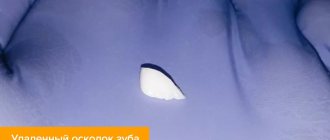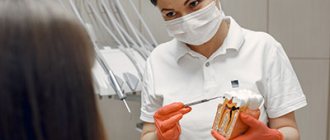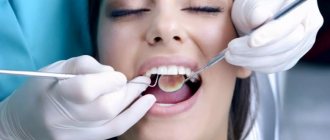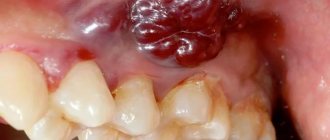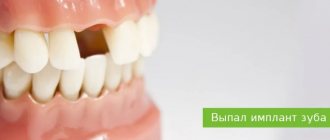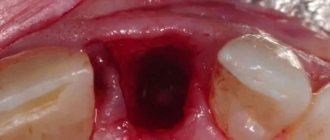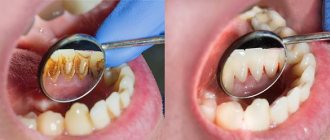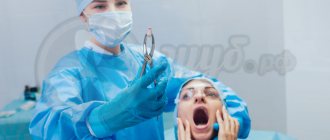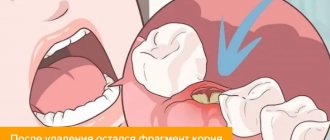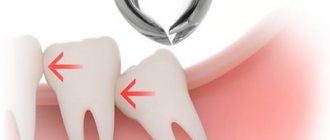26.11.2019
Many patients have itchy gums after tooth extraction. This is a dental problem, which is a fairly common consequence of surgery. The phenomenon occurs quite often in both adults and children. The operation can lead to other consequences, which will also be described in this article.
Correct oral care after tooth extraction
When dental problems arise, the dentist treating a person may recommend removing one or more affected teeth that cannot be restored. This operation is considered a minor surgical procedure. It is important to know not only how to properly prepare for it, but also what to do immediately after the operation. Of course, you can get more detailed recommendations from your doctor, but there are certain tips that will help the damaged gum heal faster and prevent gum scratching after tooth extraction.
Reason three. Bruxism
It comes in two types: daytime, when a person involuntarily clenches his teeth while awake, and nocturnally, when the disease manifests itself exclusively in sleep. Constant tension in the teeth in the case of bruxism is also accompanied by headaches in the morning, increased sensitivity, chips and cracks in the tooth enamel, when a person cannot remember the exact reason for their formation. It is important to understand here that you cannot get by with treatment from a dentist alone; you must definitely seek advice from a neurologist to find out the cause of such tension.
Taking painkillers
If the doctor left a cotton-gauze swab in the tooth socket, then check exactly when it can be removed from the oral cavity. Thanks to this tampon, the wound heals faster. To get a positive result, you should not pull it out earlier than the dentist advises.
When the anesthetic drugs stop working, quite severe pain and discomfort may occur in the injured area of the oral cavity. Most dentists allow you to take painkillers, but you should check in advance which remedy will be most effective in your situation.
It must be remembered that even a simple tooth extraction is quite a lot of stress for the human body. That is why experts advise forgetting about strong physical activity at least for a few days. It’s better to rest a little these couple of days so that the body has time to recover from a stressful situation.
If the doctor does not give other advice, then you will be able to perform your usual regular oral hygiene within 24 hours after the operation. Remember that you need to brush your teeth carefully, especially in the place where the damaged hole is located and near it. Especially if your gums itch after tooth extraction. It is advisable to add socket rinsing to regular teeth cleaning and additionally use antiseptic agents. Rinsing and brushing teeth are allowed one day after surgery.
Proper oral care, especially after surgery, is very important. Bacteria or infections can enter an open wound, so it’s worth making sure they don’t have a chance.
If you notice that the gums are very swollen, suppuration has begun, or the wound is dry, the itching is too strong, then you should immediately seek advice from a specialist. The same should be done if severe pain occurs that does not go away after a long time after the operation.
Why does the tooth under a filling itch?
After applying the filling material, individual intolerance sometimes occurs. In addition, allergic reactions appear, expressed by redness, swelling, and itching. If the symptom does not go away or gets worse, it is important to see a dentist as soon as possible.
When dental treatment is not performed correctly (for example, not all of the carious area is removed), over time the affected tissues begin to rot and decompose, causing infection. If discomfort appears, a complete replacement of the filling is indicated. If pathogenic microorganisms have managed to penetrate the pulp by this time, you cannot avoid depulpation.
Likely consequences
In addition to the fact that the gums may begin to itch after the removal of a wisdom tooth and other teeth, there is the possibility of other consequences of dental surgery. Even a minor surgical intervention has many features that must be taken into account. Initially, it is worth understanding why the gums itch after tooth extraction. Also an important topic for discussion are the factors that provoke the appearance of various disorders. Today, there are several main factors that provoke itching of the gums and other ailments after the removal of a diseased tooth.
Damage to the mucous membrane
If a person consumes a lot of very hot or cold food, spicy dishes, drinks, then various types of injuries, ulcers, and erosions can form in the oral cavity. This also occurs due to fairly intensive brushing of teeth or incorrect, very careless actions of the dentist who carried out the treatment. This occurs especially often after one or more teeth have been removed. The cause in this situation is damage to the gums, so the gums very often itch after tooth extraction during healing.
Reason one. Injury
If you were hit in the jaw or fell, after which the symptoms described above appeared, then it is likely that as a result of this incident the pulp, which is a neurovascular bundle, was damaged. As a result of the injury, it became inflamed, swelling formed, and now there is a feeling of compression of the hard tissues that surround it. In this case, the first signal will be itching, only after it does throbbing pain appear.
Also, the tooth can change its color - suddenly acquire a shade from gray to pinkish. The latter signals that serious damage has been sustained and the pulp has begun to die as a result of inflammation.
Diseases of an inflammatory or infectious nature
This group of reasons includes the development of dental pathologies such as gingivitis, stomatitis, periodontitis, and candidiasis. Diseases occur due to the rapid proliferation of pathogenic microflora of various types. Also, a factor that provokes the appearance of pathology may be improper oral care.
Quite often you may encounter the fact that along with the development of an inflammatory or infectious disease, bleeding appears, the gums become very sensitive to various irritants, and a very unpleasant odor appears from the mouth. For this reason, the gums may itch after tooth extraction.
Leukoplakia
This disease is characterized by a special condition, which, as a rule, appears immediately before the development of oncology. In this case, leukoplakia can manifest itself not only as very severe itching in the gum area. Other symptoms also occur: a feeling of numbness, white spots and a dense coating form on the affected area of the gums or oral cavity. Almost all patients suffering from leukoplakia complain about this. In most cases, the disease affects people who have a long history of smoking and smoke more than a pack of cigarettes per day.
When do you need specialist help?
You should contact your dentist even if you have minor discomfort in your mouth. It is easier to cure any disease at an early stage of development. The help of a specialist is necessary if itching in the gums is accompanied by:
- bleeding,
- unpleasant smell,
- redness of soft tissues,
- erosions and suppuration,
- pain of different localization.
These symptoms indicate serious problems that require medical or surgical treatment.
Allergic reaction
The most common cause of itching of the gums after tooth extraction and discomfort in the oral cavity can be called a direct allergic reaction. It can occur not only due to medications that were used during tooth extraction, but also due to food products, stabilizers, preservatives, and dyes that they contain. Sometimes allergies occur due to improperly selected hygiene products or household chemicals that somehow got onto the oral mucosa.
Itchy gums in an adult: reasons
The most common factors causing unpleasant symptoms:
- violation of the integrity of soft tissues due to prosthetics;
- allergy;
- dental and oral diseases;
- chronic pathologies of internal organs and systems;
- deficiency of vitamins and minerals;
- bad habits (smoking, alcohol abuse); stress, nervous shock;
- colds, infections;
- medical errors during medical procedures.
Damage
If the dentures are just installed, itchy pain in the teeth and gums is possible - the itching itself appears due to the inconvenience when the structure scratches soft tissues and injures the mucous membranes.
In addition, injuries are caused not only by orthodontic and orthopedic devices, but also by eating too rough food, brushing with too hard bristles, and using toothpicks.
At the edges of the jaws, the problem arises due to the eruption of “eights”. The crown does not come out immediately, but gradually, and patients most often experience persistent inflammation.
Manifestation of an allergic reaction
One of the reasons why the teeth of the lower jaw, as well as the upper rows, itch and itch in adults is allergies. Allergens are mainly played by various hygiene products (pastes, mouthwashes), which contain flavorings and preservatives. Medical ointments applied to fix prostheses also provide similar effects.
Sometimes the problem is caused by the removable or non-removable structures themselves, namely the materials from which they are made (nylon, acrylic). Unpleasant symptoms also appear when wearing braces.
When an allergic reaction is to blame, other signs also appear:
- redness;
- pain;
- swelling.
In this case, it is recommended to avoid contact with the allergen and take an antihistamine. To prevent complications, a mandatory visit to the doctor is indicated.
Diseases of the oral mucosa
If your teeth and gums itch and ache, this may be caused by dental and other pathologies. The following diseases act as provoking factors:
- Periodontal disease, periodontitis. Periodontal tissues become inflamed and destroyed, followed by loosening and loss of teeth. According to statistics, about 15% of patients with similar ailments experience itching.
- Gingivitis. The soft tissues and interdental spaces become red, swollen, bleed and hurt.
- Candidiasis. Fungal infection is accompanied by the appearance of a dense layer of whitish plaque. In this case, the sick person constantly experiences unpleasant sensations in the mouth.
- Stomatitis. Painful ulcers bring many problems; their formation does not go unnoticed.
- Leukoplakia. The upper epithelial layer thickens and becomes whitish or gray in color. There is a burning sensation and other discomfort in the oral cavity.
There are other diseases that can lead to pathology. They have similar symptoms, so only a doctor can make a final diagnosis. In this case, with a high degree of probability, not only a visual examination will be required, but also other research methods (x-ray, flora smear, orthopantomography, etc.).
Acute deficiency of vitamins and important microelements
If the body receives an insufficient amount of essential substances, this negatively affects the condition of the mucous membranes. There is a feeling that the teeth are very itchy, as if the soft tissues are very inflamed.
First of all, the fibers weaken, they become looser, itchy, and bleed. If the situation is advanced, loosening and loss of dentition in whole or in part cannot be avoided.
Not all components affect the gums to the same extent. Some of them play a vital role, and their deficiency affects all structures. This mainly concerns zinc and vitamin C.
Nervous system disorders
Similar symptoms are often observed in neurotic disorders. Depression, stressful situations, severe mental shocks affect physiological processes in the human body. The oral cavity also suffers.
Dentists often encounter cases where a particular pathology occurs against the background of temporary or permanent deviations associated with the psyche and certain events in the patient’s life that disrupt the usual routine.
Dental diseases
If you think about the most common reasons why teeth itch in a teenager or an adult, the first thing that comes to mind is diseases of the incisors, canines and molars, as well as other problems associated with them. Common factors:
- Accumulation of a large amount of plaque on the enamel, subgingival deposits, tartar. This occurs due to poor-quality hygienic care or due to disruptions in the gastrointestinal tract or endocrinological pathologies.
- Bruxism. The jaws involuntarily clench and squeak during sleep. The top hard layer is noticeably erased.
- Initial caries, pulpitis, characterized by a sluggish course. In this case, unpleasant itching appears in the area of the affected units.
The same signs are possible with poor quality therapy or after extraction. This indicates the occurrence of complications and requires contacting a doctor.
Itchy gums after tooth extraction: how to treat
The gums can itch for a variety of reasons; therefore, today there is no single treatment regimen approved by dentists.
Initially, you need to remove all those factors that can provoke the development of a particular pathology. Also visit the dentist to eliminate plaque, sources that injure the gums and mucous membrane of the oral cavity, foci of inflammation or infection. To eliminate itching of the gums, you can use antihistamines, antibiotics, and oral disinfectants. Before starting use, you should definitely consult with your dentist so that he can select the most suitable means, having previously established the causes of such a problem as itching of the gums after tooth extraction. Category: Tooth extraction Published by Mister stomatolog
What happens to gum tissue during the implantation process?
There are different types of implants: subosseous implants are inserted into the jaw bone, periosteal implants are inserted into the soft tissues of the jaw. Sometimes the socket of an extracted tooth is used for implantation, but in some cases it is necessary to artificially deepen the socket or completely dissect the gum from the outside - this is done either with a scalpel or a laser.
After the incision, surgical sutures are made on the gums to hold the tissue until it heals completely.
In some cases, after installation of the implant, gum grafting is performed separately - then healing takes several weeks longer.

